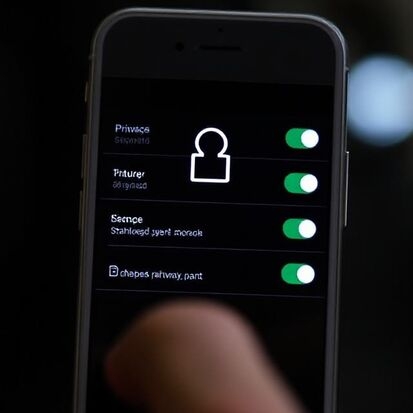Phone privacy settings 2025
Ever feel like your phone’s listening to every word you’ve ever uttered? It’s not just paranoia. In reality, your phone may very well be spying on you, collecting data that you are unaware of. But don’t freak out — there’s an easy solution that could bring an end to this digital spying now. Read on to learn what’s happening, why it’s dangerous, and, most crucially, how to take back your privacy.
The Secret Behind Your Phone Listening in on You

Imagine this: You have a conversation about a new pair of shoes that you are considering buying, and the next time you open your browser up an ad for those exact shoes appears. Coincidence? Not likely. This isn’t merely a creepy coincidence — it’s how your phone is collecting your personal information, processing it and serving you ads based on what it overheard.
But how does that even work? Your phone has settings that allow it to track your activity, and some of the most intrusive are voice assistant features — such as Siri, Google Assistant or Alexa. These assistants can be very helpful, but they may also be listening when you aren’t expecting it.
Why Voice Spying Works: The Science
Experts have warned for years about the potential dangers of voice assistants. Voice assistants are always on standby, waiting to listen to their wake word, but this doesn’t mean they only hear you when you invoke them, according to a 2021 study published by The Guardian. In fact, they often passively listen in the background, piping that data back to servers for processing. Though these recordings are intended to help improve the assistant’s precision, there are significant issues with how this data is stored and used.
This extends beyond just voice assistants. Smartphone apps, location services and even permissions you’ve unwittingly granted can all convert your phone to a surveillance device. Social media apps, for one, have long been allowed to use your location, activity and even photographs to tailor what you see — and what you don’t — on their platforms, knowing it comes at the expense of your privacy.
Examples of Big Companies in the Wrong
The infamous Facebook data collection scandal is a case in point. Data collection: Facebook had been collecting more data on users than they originally had let on–location data, browsing activity, and even private messages. The FTC ended up fining the company $5 billion over the scandal, slash which received minor opposition concerning how much access and management users really have over their data.
“Ie-eavesdropping” was also the charge leveled against Apple’s Siri in 2019, after reports that an Apple contractor had listened to snippets of conversations without users’ knowledge and consent, which triggered an outcry in public and changes to voice data collection practices. Apple has since promised to be more transparent about the data it collects, but it was too little, too late.
The Hidden Setting You Should Disable Right Now
Now that we unturned the scary-real side of your phone spying on you, let’s cover the solution. The good news? It’s easier to treat than you’d expect.
The main setting you need to disable is “Always On” voice recognition. This function is standard in the majority of smartphones and holds your voice assistant always on, responsive to commands such as “Hey Siri” or “OK Google.” Though convenient, that also means your phone records more than you might realize.
- Here’s how to turn it off:
- For iPhone (Siri):
- So to fix it, just go to Settings > Siri & Search > Disable Listen for “Hey Siri”
- For Android (Google Assistant):
Drive to Settings > Google > Search, Assistant & Voice > Voice > Turn Off Hey Google.
Disabling this setting stops your phone from passively listening in on conversations and decreases the amount of data your phone collects tremendously.
Why It All Matters More Than You Think
You might be thinking to yourself, “What is the big deal? It’s just an ad.” Well, it’s more than ads. It’s about having control over your own data and privacy. Each time you allow your phone to listen in without your consent, you consent to giving up more control of your own data.
Not to mention that an always-on voice assistant opens you, up, too, to being hacked. Hackers have made use of these features to do such things as spying on users in recent years, according to reports. And by disabling these settings, you’re doing more than putting your foot down on targeted advertising — you’re saving yourself from exposure to needless risk.
As with the last post, the second inserted an expert opinion to the digital privacy lib into data tag.
“Privacy isn’t merely about keeping secrets. “It’s about making sure that we’re in charge of our own lives,” says Sarah Stevens, Ph.D., a leading cybersecurity researcher. “Whenever you allow applications or assistants to listen in on you, you’re giving bits and pieces of yourself to corporations that probably do not have your best interest in mind.”
To do so right now, and deactivate these settings, you are sending a powerful message about your rights as a user and how much you want to control your personal information.
Protect Your Digital Privacy with Us

The reality is that the stats of how much data your phone collects are generally unknown. But now that you do know, it’s time to act. Don’t consent to your phone invading your privacy. Switch off these settings and see how you feel about your digital safety.
Your phone should be in service of you — and not the other way around. Reclaim your personal data, protect your privacy, and keep your communication private.
Act now! Today, disables the “Always On” voice recognition feature and regain your privacy. You’ll be amazed at how much more secure you feel when you do.
The power is in your hands — don’t allow your phone to spy on you any more!




